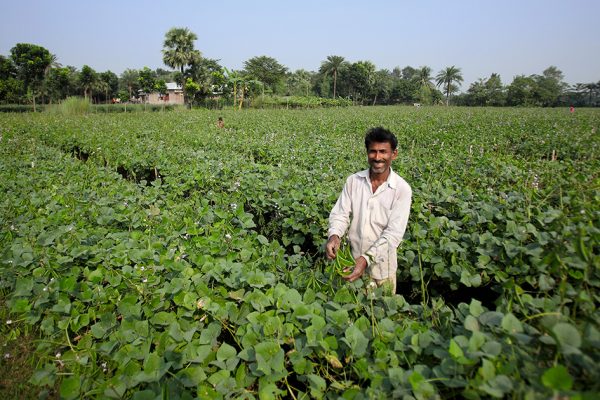The business of turning faecal waste into energy
Reading Time: 2 minutes
The BRAC Water, Sanitation and Hygiene (WASH) programme in Bangladesh is planning to convert faecal matter from pit latrines into commercially viable fertiliser, biogas and electricity. The aim is to complete the sanitation chain by making material from millions of pit latrines safe and economically productive. Babar Kabir, senior director of the BRAC WASH programme, says that there is a sound business case for investment in bio-energy units that could generate electricity on a large scale.
Watch Dr Babar Kabir speak about the business case for sanitation during International Water Week in Amsterdam.
The BRAC Water, Sanitation and Hygiene (WASH) programme in Bangladesh is planning to convert faecal matter from pit latrines into commercially viable fertiliser, biogas and electricity. The aim is to complete the sanitation chain by making material from millions of pit latrines safe and economically productive. Babar Kabir, senior director of the BRAC WASH programme, says that there is a sound business case for investment in bio-energy units that could generate electricity on a large scale. But he believes that investors must be in for the long run as the most important return will be improved health and sanitation.
Speaking on World Toilet Day on 19 November, Dr Kabir warned that Bangladesh’s sanitation situation is at risk; if they fail to empty pit latrines safely, it can contaminate the ground water.
As of June 2013, BRAC WASH has supported 28.6 million people achieve safe sanitation, and engaged a total of 63.5 million in hygiene education. In its first five years, BRAC WASH helped communities install approximately five million new or improved toilets.
Preventing the cycle of contamination
At International Water Week in Amsterdam, Babar Kabir said that the main motivation for starting the business was the social impact it would make in terms of health and sanitation.
“We are using a very simple technology, which is pit latrines, so we have reached a point where the pits are filling up, and we have just deferred the problem if we can’t handle the disposal safely. If they empty the pits and dump it into a water body… the whole cycle of contaminations starts again.”
The programme is commissioning a feasibility study looking at the cost of production, levels of investment, potential returns and health benefits. A pre-feasibility study found that the proposal “provides a commercially viable solution for the sustainable and safe emptying of pit latrines”.
Large scale solutions needed
“We are trying to build up a business case for micro- and macro-level faecal sludge management. There is going to be compost; there is going to be biogas, which can be used to generate electricity, and if we are smart enough we can capture the heat from the generator and build a cold storage for food preservation.”
BRAC proposals were on a far larger scale than any other innovative case study presented in Amsterdam. The plan in Bangladesh is to convert 6,000 tons a year of faecal sludge, 4,000 tons of corn and maize agricultural residue, and chicken litter to generate power and fertiliser.
The meeting in Amsterdam illustrated that any scheme needs long-term support. Four other innovative cases were presented at a workshop titled, ‘Making sustainable business out of sanitation’, including SANERGY who won the prestigious Sarphati Award for their work in the slums of Nairobi. Yet none of the four cases breaks even on the waste material side of its business so consequently it was acknowledged that there is still some way to go.
Dr Kabir said, “You have to understand that the business case is not as simple as a normal investment where you would expect a return in five to seven years. This is going to take longer, because there is a social impact involved with it so your internal rate of return is going be slightly longer. So any investor in the sanitation business would require a little bit of patience before we can hit the break-even point.”
Peter McIntyre is a freelance journalist and communications consultant from the UK.





